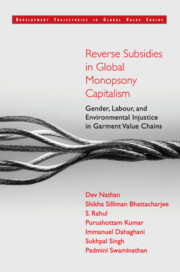 Reverse Subsidies in Global Monopsony Capitalism
Reverse Subsidies in Global Monopsony Capitalism 11 - Value Capture in Global Monopsony Capitalism
Published online by Cambridge University Press: 21 January 2022
Summary
In Chapters 4 to 10, we saw how value is extracted through the purchase of inputs, gendered labour power, and environmental services at prices below their respective costs of production. Such acquisitions of inputs below their costs of production were identified as subsidies. These subsidies are extracted in different nodes or locations: the garment manufacturing factory, the household, including the rural household, and the enviroment. In the framework chapters, we have argued that these subsidies, though extracted at different nodes of the global value chain (GVC), end up with, or are captured by, the brands that govern or are lead firms in these value chains. This argument is similar, but not equal, to the Marxist distinction between the location of value production and realization, where there is a distinction in the firm and country location of value production and value realization (D. Harvey 2017).
In this chapter, we discuss the manner in which monopsony functions to bring about value capture by brands. The analysis in this chapter is built on the primary material gathered from discussions with over 100 suppliers from different research projects during the five-year period of 2016 to 2020. One round of investigations was with about 60 garment suppliers across the Delhi National Capital Region (NCR), Jaipur, Surat, Bangalore, and Tiruppur as part of the International Labour Organisation Apparel Export Promotion Corporation (ILO-AEPC), a quasi-government body study of management practices in Indian garment suppliers (Nathan and Harsh 2018). The management weaknesses reported in this study led to the ILO-AEPC Handbook of Good International Practices in the Garment Industry. This report also formed the basis of a paper (Nathan and Harsh 2018) on process upgrading in the garment industry.
During 2017–2019, the Society for Labour and Development (SLD) carried out a questionnaire-based survey of 45 garment firms in Delhi NCR, Bangalore, and Tiruppur. The data from this survey was filled out with inputs from senior officials of the firms. Besides these project-based surveys,the researchers have also interacted with various suppliers and brand representatives in many multi-stakeholder initiatives. These interactions date back to our participation in the Capturing the Gains (CtG) research programme between 2011 and 2016.
Information gathered from these discussions do not fit into survey-type results. But they are important in forming impressions of how buyer–supplier bargaining functions.
- Type
- Chapter
- Information
- Reverse Subsidies in Global Monopsony CapitalismGender, Labour, and Environmental Injustice in Garment Value Chains, pp. 204 - 224Publisher: Cambridge University PressPrint publication year: 2022


